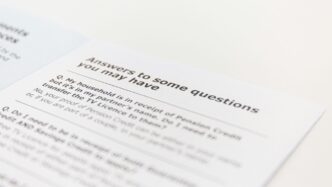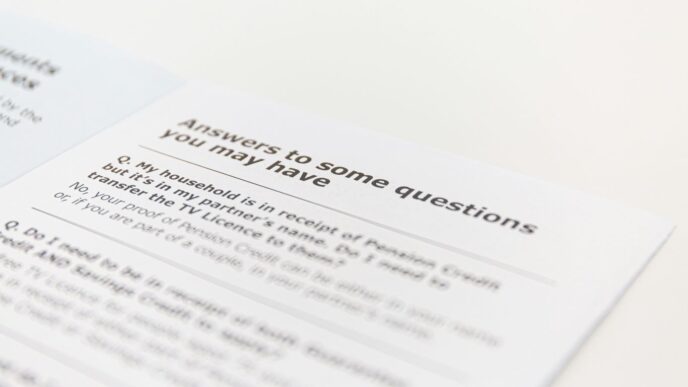Getting your first job can feel like a big hurdle, and the interview part is often the most nerve-wracking. Especially that HR interview – it feels like they’re trying to figure out if you’re a good fit for the company, not just if you can do the work. But honestly, it’s not as scary as it seems. Most HR folks ask pretty similar things to get a feel for who you are. We’ve put together a list of the top 10 HR interview questions and answers for freshers, so you can walk in feeling a lot more confident. Let’s get you ready to ace it!
Key Takeaways
- Prepare a concise summary of your background, skills, and enthusiasm for the ‘Tell Me About Yourself’ question.
- When discussing strengths, connect them directly to the job requirements.
- For weaknesses, choose something minor and explain how you’re actively working to improve it.
- Research the company thoroughly to explain why you want to work there and what you can offer.
- Be realistic and ambitious with your five-year plan, showing a desire for growth within the company.
1. Tell Me About Yourself
This is your opening act, the first impression you make. Think of it as a quick, professional introduction that sets the stage for the rest of the interview. You don’t want to just recite your resume; the interviewer has that. Instead, give them a snapshot of who you are professionally, highlighting key experiences and skills that are relevant to the job you’re applying for.
Start with your current situation or recent background. For example, you could mention your degree, any relevant internships, or recent projects. Then, connect that to your skills. What have you learned? What can you do?
- Highlight relevant skills: Mention abilities that directly relate to the job description. For freshers, this might include academic achievements, project work, or even volunteer experience where you developed certain competencies.
- Showcase soft skills: Don’t forget about things like teamwork, communication, problem-solving, and adaptability. These are often just as important as technical skills.
- Express enthusiasm: Briefly mention why you’re interested in this specific role and company. This shows you’ve done your homework and are genuinely excited about the opportunity.
The goal is to give a concise, compelling overview that makes the interviewer want to learn more. It’s about showing them you’re a good fit and that you’re eager to contribute. You can find some great tips on how to structure this introduction effectively.
2. What Are Your Strengths
This is a classic interview question, and for good reason. It’s your chance to show the interviewer what makes you a great fit for the job. Think about what you do well and, more importantly, how those skills can help the company.
The key is to be specific and connect your strengths directly to the role you’re applying for. Don’t just say you’re a ‘hard worker.’ Instead, explain how you work hard and what results that brings.
Here are a few common strengths that often come up, and how you might talk about them:
- Problem-Solving: "I enjoy tackling challenges and finding practical solutions. In my last project, we ran into an unexpected technical issue, and I was able to research and implement a fix that kept us on schedule."
- Adaptability: "I’m comfortable with change and can adjust quickly to new situations. When our team’s workflow shifted last quarter, I was able to pick up the new process efficiently and help others get up to speed."
- Communication: "I believe clear communication is vital. I make an effort to listen actively and express my ideas clearly, whether I’m writing an email or discussing a project with colleagues. This helps prevent misunderstandings and keeps everyone on the same page."
- Organization: "I’m good at managing my time and keeping track of tasks. I use tools like [mention a tool, e.g., Trello or a simple to-do list] to prioritize my work and make sure nothing falls through the cracks. This helps me meet deadlines consistently."
When you’re preparing your answer, think about your experiences. What have you done that you’re proud of? What positive feedback have you received from professors or past supervisors? You can even look at the job description again and see which of your skills directly match what they’re looking for. It’s all about showing them you have what it takes to succeed in this specific role. For more tips on interview preparation, check out this guide to interview questions.
3. What Are Your Weaknesses
When interviewers ask about weaknesses, they’re not trying to catch you out. They want to see if you’re self-aware and if you’re actively trying to get better. It’s a chance to show you can be honest and that you’re committed to growing.
Instead of saying something vague like ‘I work too hard’ or ‘I’m a perfectionist,’ try to pick something real but not a deal-breaker for the job. For example, maybe you sometimes get so focused on a task that you forget to check in with others as often as you should. You could say something like:
"One area I’m focusing on improving is my delegation skills. In past projects, I’ve sometimes taken on too much myself because I wanted to ensure it was done just right. I’ve realized that this isn’t always the most efficient approach and can slow things down. To address this, I’ve been practicing identifying tasks that can be effectively handed off and trusting my teammates to deliver. I’ve found that clear communication upfront about expectations makes a big difference, and I’m getting better at letting go and empowering others."
Another example could be related to public speaking or presenting in front of large groups. If that’s something that makes you a bit uneasy, you can frame it positively:
"Presenting to very large audiences is something I’m actively working on. While I’m comfortable discussing ideas in smaller team settings, I’ve noticed I can get a bit nervous when addressing bigger crowds. To improve, I’ve joined a local Toastmasters group and have been volunteering for more presentation opportunities within my previous roles. It’s helping me build confidence and refine my delivery."
The key is to be honest, pick a weakness that isn’t central to the job you’re applying for, and most importantly, show that you have a plan to overcome it.
4. Why Do You Want To Work With Us
This is a really important question, and it’s your chance to show you’ve done your homework. Instead of just saying you need a job, focus on what draws you to this specific company and this particular role. Think about what you’ve learned from the job description, the company’s website, or even recent news. What specifically about their work or mission excites you?
For example, you could mention:
- Alignment with company values: "I’ve been following [Company Name]’s work in [specific area], and I really admire your commitment to [company value, e.g., sustainability, innovation, community]. That’s something I deeply care about too."
- Growth opportunities: "The job description mentioned opportunities for [specific skill development or project type], which is exactly what I’m looking for as I start my career. I’m eager to learn and contribute in that area."
- Company culture: "From my research and even the way this interview has felt so far, the collaborative and forward-thinking culture here really appeals to me. I believe I’d fit in well and be able to contribute positively."
- Impact of the role: "I’m particularly interested in how this role contributes to [specific company goal or product]. I’m excited by the prospect of being part of that and making a tangible contribution."
Try to connect your own skills and aspirations to what the company is doing. It shows you’re not just looking for any job, but you’re genuinely interested in their job and their company.
5. Where Do You See Yourself In Five Years

This is a classic question, and it’s really about seeing if your goals line up with what this company can offer and if you’re likely to stick around for a while. They want to know you’re thinking ahead, but not so far ahead that you’re planning to jump ship or become their boss next week.
Think about it this way: you’re fresh out of school, so you’re not expected to have a rigid, five-year plan mapped out to the minute. What they are looking for is ambition, a desire to learn, and a commitment to growing within a company. It’s a good idea to show that you’re eager to develop your skills and take on more responsibility.
Here’s a way to approach it:
- Focus on skill development: Mention that you want to become really good at the core aspects of the job you’re applying for. You could say something like, "In five years, I see myself having a solid grasp of [mention a key skill or area related to the job], and I’d like to be contributing to more complex projects in that area."
- Show interest in growth within the company: Express that you’re looking for opportunities to learn and grow. "I’m hoping to take advantage of training opportunities here and really build my career within an organization like yours."
- Connect your goals to the company’s success: Frame your aspirations in a way that benefits them. "My goal is to become a go-to person for [specific area] and help the team achieve its objectives more effectively."
Ultimately, you want to convey that you’re looking for a place to build a career, not just a temporary stop. It’s about showing you’re motivated to learn, contribute, and grow with the company over the next five years.
6. Why Are You Leaving Your Current Company

This is a really common question, and it’s your chance to show you’re forward-thinking, not just running away from something. The key here is to be honest but professional.
Think about what you’ve learned and what you’re looking for next. It’s not about complaining about your old job; it’s about explaining why this new opportunity is a good fit for your career path.
Here are a few ways to approach it:
- Seeking New Challenges: You’ve learned a lot in your current role and feel ready to take on more complex projects or responsibilities that this new company offers. You might say something like, "I’ve really grown in my current position and I’m grateful for the experience. However, I’m now looking for an opportunity where I can further develop my skills in [specific area relevant to the new job] and contribute to a team working on [type of projects the new company does]."
- Career Growth and Development: You’re looking for a company that aligns with your long-term career goals. For example, "My goal is to build a career in [industry/field], and I see this role as a significant step towards that. I’m particularly drawn to your company’s reputation for [mention something specific like innovation, training programs, or industry leadership]."
- Company Culture or Mission Alignment: If you’re genuinely impressed by the company’s values or mission, mention it. "I’ve been following [Company Name]’s work in [specific area] for a while, and I’m really inspired by your commitment to [company mission/value]. I’m eager to join a team that shares these principles and contributes to such meaningful work."
Avoid badmouthing your previous employer, colleagues, or the work itself. Even if there were issues, focus on the positive aspects of the new role and your desire for growth. It’s about what you’re moving towards, not what you’re moving away from.
7. Tell Me About A Time You Made A Mistake
Everyone messes up sometimes, right? It’s not about being perfect; it’s about how you handle things when they don’t go as planned. When an interviewer asks about a mistake, they’re really trying to see if you can own up to it, learn from it, and move forward without making the same error again. It shows maturity and a willingness to grow.
Think about a time when you dropped the ball on a task or project. Maybe you misunderstood instructions, or perhaps you took on too much and couldn’t deliver on time. The key is to pick a mistake that wasn’t a total disaster and that you were able to fix or learn from. For instance, in a previous role, I was working on a report and accidentally used outdated data. I didn’t catch it until after I’d submitted it. My immediate reaction was to feel pretty embarrassed, but I knew I had to fix it fast.
Here’s how I approached it:
- Acknowledge the error: I immediately informed my supervisor about the mistake and the potential impact.
- Rectify the situation: I worked late that evening to pull the correct data and re-run the report.
- Identify the root cause: I realized I hadn’t double-checked the data source properly, relying too much on memory.
- Implement a preventative measure: Since then, I’ve made it a habit to always verify my data sources before starting any analysis, and I’ve created a small checklist for myself before submitting reports.
This experience taught me the importance of meticulousness and the value of having a clear process, even for seemingly simple tasks. It’s a lesson that has stuck with me and helps me avoid similar issues now. You can find some great strategies for answering this question on interview preparation sites.
8. Describe A Time You Dealt With A Difficult Colleague
Dealing with people who are tough to work with is a part of almost any job. It’s not about avoiding conflict, but about how you handle it when it pops up. Think about a time when you had to work closely with someone whose style or attitude made things challenging.
The key is to show you can stay professional and find a way to move forward.
For example, I once worked on a project where a teammate was consistently late with their contributions, which put the rest of us behind schedule. Instead of getting frustrated or complaining, I decided to talk to them directly, but in a private setting. I asked if everything was okay and if there was anything making it hard for them to keep up. It turned out they were juggling a lot of personal stuff that week. We talked about how their delays were affecting the team, and I offered to help them break down their tasks into smaller steps. We also agreed on clearer check-in times. After that conversation, things improved a lot. They started meeting deadlines, and our team’s overall performance got better. It taught me that sometimes, a little understanding and open communication can go a long way in resolving workplace friction.
9. What Can You Offer Us That Other Candidates Can’t
This is where you get to shine and show the hiring team what makes you stand out. Instead of just saying you’re a hard worker, think about specific skills or experiences you have that directly address the company’s needs. Maybe you’ve got a knack for a particular software the team uses, or perhaps you’ve successfully tackled a similar challenge in a previous project. Highlighting unique contributions, even small ones, can make a big difference.
Think about it this way:
- Problem-Solving Approach: Describe a time you faced a tricky problem and how you figured it out. What was your thought process? Did you come up with a creative solution?
- Specific Technical Skills: Do you know a programming language, a design tool, or a specific piece of equipment that’s mentioned in the job description? Mention it! If you’ve used it to achieve something specific, even better.
- Unique Perspective: Sometimes, bringing a fresh viewpoint from a different background or industry can be incredibly helpful. How might your experiences offer a new way of looking at things for the team?
It’s not about being boastful, but about showing you’ve thought about how your individual talents can benefit the company in ways others might not. Be genuine and focus on what you can do for them.
10. What Makes You Most Qualified For This Position
This is your chance to really sell yourself and connect your skills directly to what the company needs. Think about the job description and what they’re looking for. What specific skills or experiences do you have that directly address those needs? It’s not just about listing your qualifications; it’s about showing how those qualifications will benefit them.
For example, if the job requires strong problem-solving abilities, you could say something like: "I’ve always enjoyed tackling complex problems. In my previous project, we faced an unexpected technical hurdle that threatened to delay our launch. I took the initiative to research alternative solutions, collaborated with a few team members, and we implemented a workaround that not only solved the issue but also improved system efficiency by 15%. I believe this kind of proactive problem-solving is exactly what’s needed for this role."
Here’s a breakdown of what to focus on:
- Directly address the job requirements: Go through the job posting point by point and think about how your background matches each one. Don’t be afraid to be specific.
- Highlight relevant experiences: Mention projects, internships, or even volunteer work where you used the skills they’re asking for. Quantify your achievements whenever possible. For instance, instead of saying "improved a process," say "reduced processing time by 20%."
- Showcase your learning ability and enthusiasm: As a fresher, they know you might not have years of experience. What they do want to see is that you’re eager to learn, adaptable, and can pick things up quickly. Mentioning how you’ve successfully learned new skills in the past can be very convincing.
Ultimately, you want to convey that you understand their needs and are the best person to meet them because of your unique blend of skills, experiences, and drive.
Wrapping It Up
So, we’ve gone through some of the most common questions you’ll likely hear in an HR interview as a fresher. Remember, these questions aren’t meant to trip you up. They’re really just a way for the interviewer to get to know you better – your skills, how you think, and if you’d be a good fit for the team. Practice your answers, be honest, and try to show your enthusiasm. You’ve got this!
Ace Your First Job: Top 10 HR Interview Questions and Answers for Freshers
Tell Me About Yourself
This is your chance to make a great first impression! Think of it as a quick introduction to who you are. Start by saying your name and maybe where you’re from. Then, mention what you studied and what you’re good at, like being a good team player or a quick learner. Talk about any skills that match the job you’re applying for. It’s also nice to share a hobby or two to show you have a life outside of work. End by saying how excited you are about the job and how you want to help the company.
What Are Your Strengths?
Think about what you do really well. Are you super organized? Great at talking to people? Maybe you’re really good at solving problems or learning new things quickly. Pick a few strengths that fit the job you want. For example, if it’s a job where you work with others, say you’re a good team player. If it needs you to be creative, mention that. Give a small example of when you used that strength.
What Are Your Weaknesses?
Everyone has things they aren’t great at, and that’s okay! The trick is to pick a weakness that isn’t super important for the job. For instance, maybe you sometimes get too focused on details, which can make you take a little longer on tasks. But then, explain how you’re working to get better at it, like by using a timer or asking for help. This shows you’re aware and trying to improve.
Why Do You Want To Work With Us?
Do some homework before the interview! Learn about the company. What do they do? What are their goals? Then, explain why you like them. Maybe you admire their products, their company culture, or how they help people. Connect what you like about them to what you want in a job and how you can help them succeed. Show them you’re not just looking for any job, but *this* job.
Where Do You See Yourself In Five Years?
This question asks about your future plans. It’s good to show you’re ambitious but also realistic. Talk about wanting to learn new skills, take on more responsibility, and grow with the company. You could say you hope to become an expert in your field or maybe lead a small team. The key is to show you want to build a career there, not just have a temporary job.
Why Are You Leaving Your Current Company?
If you’re currently working, be honest but positive. If you’re leaving for a better opportunity, like more chances to learn or a job that’s a better fit for your career goals, say that. Avoid saying bad things about your old boss or company. Focus on what you’re looking for in your next role and how this new job offers that. If you’re a fresh graduate, you can say you’re eager to start your career.














